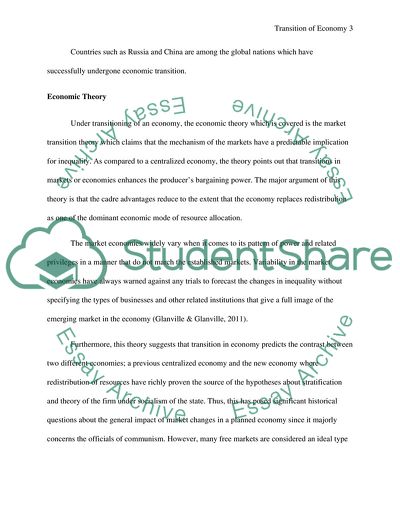Cite this document
(The transition from a centrally planned economy to a free market or a Essay - 2, n.d.)
The transition from a centrally planned economy to a free market or a Essay - 2. https://studentshare.org/macro-microeconomics/1807122-the-transition-from-a-centrally-planned-economy-to-a-free-market-or-a-mixed-economy-involves-state-owned-enterprises-being-privatised-but-economists-debate-as-to-whether-this-is-actually-beneficial-to-the-countrys-economy-discuss-this-statement
The transition from a centrally planned economy to a free market or a Essay - 2. https://studentshare.org/macro-microeconomics/1807122-the-transition-from-a-centrally-planned-economy-to-a-free-market-or-a-mixed-economy-involves-state-owned-enterprises-being-privatised-but-economists-debate-as-to-whether-this-is-actually-beneficial-to-the-countrys-economy-discuss-this-statement
(The Transition from a Centrally Planned Economy to a Free Market or a Essay - 2)
The Transition from a Centrally Planned Economy to a Free Market or a Essay - 2. https://studentshare.org/macro-microeconomics/1807122-the-transition-from-a-centrally-planned-economy-to-a-free-market-or-a-mixed-economy-involves-state-owned-enterprises-being-privatised-but-economists-debate-as-to-whether-this-is-actually-beneficial-to-the-countrys-economy-discuss-this-statement.
The Transition from a Centrally Planned Economy to a Free Market or a Essay - 2. https://studentshare.org/macro-microeconomics/1807122-the-transition-from-a-centrally-planned-economy-to-a-free-market-or-a-mixed-economy-involves-state-owned-enterprises-being-privatised-but-economists-debate-as-to-whether-this-is-actually-beneficial-to-the-countrys-economy-discuss-this-statement.
“The Transition from a Centrally Planned Economy to a Free Market or a Essay - 2”. https://studentshare.org/macro-microeconomics/1807122-the-transition-from-a-centrally-planned-economy-to-a-free-market-or-a-mixed-economy-involves-state-owned-enterprises-being-privatised-but-economists-debate-as-to-whether-this-is-actually-beneficial-to-the-countrys-economy-discuss-this-statement.


